| British Rail Class 307 | |
|---|---|
 Class 307 at Wakefield Westgate in 1991 | |
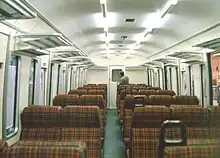 Inside a refurbished unit | |
| In service | 1956–1993[1] |
| Manufacturer | British Rail |
| Order no. | |
| Built at | |
| Constructed | 1954–1956[2] |
| Entered service | 1956[1] |
| Refurbished | |
| Number built | 32 |
| Successor | Class 321 |
| Formation |
|
| Diagram |
|
| Design code | AM7 |
| Fleet numbers |
|
| Capacity |
|
| Operators | British Rail |
| Depots | |
| Specifications | |
| Car body construction | Steel[4] |
| Train length | 265 ft 8+1⁄2 in (80.988 m)[3] |
| Car length |
|
| Width | 9 ft 3 in (2.824 m)[4] |
| Height | 13 ft 0+1⁄2 in (3.975 m)[3] |
| Doors | Slam[3] |
| Articulated sections | 4 |
| Wheelbase | 46 ft 6 in (14.173 m)[4] |
| Maximum speed | 75 mph (121 km/h)[4] |
| Weight |
|
| Traction motors | 4 × GEC WT344 of 170 hp (130 kW)[5] |
| Power output | 700 hp (520 kW) |
| HVAC | Electric[4] |
| Electric system(s) | |
| Current collector(s) | Pantograph |
| UIC classification | 2′2′+Bo′Bo′+2′2′+2′2′ |
| Bogies | |
| Braking system(s) | Air (Auto/EP)[3] |
| Safety system(s) | AWS[4] |
| Coupling system | Buckeye[3] |
| Multiple working | Within ER fleet[3] |
| Track gauge | 1,435 mm (4 ft 8+1⁄2 in) Standard gauge |
| Notes/references | |
| 42 × DTs converted 1994–96 to PCV for RES[3] | |
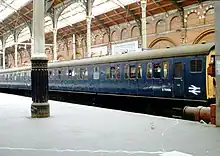
The British Rail Class 307 electric multiple units were built by BR at Eastleigh Works from 1954 to 1956. They were initially classified as AM7 before the introduction of TOPS.
Description
Thirty-two of these 4-car units were built for services on the Great Eastern Main Line.
All units were formed of four cars. When originally built, units were numbered in the range 01s-32s and were composed of two outer driving trailers, an intermediate trailer composite (i.e. with some first-class seating) and an intermediate motor brake. The units were constructed to operate off the 1,500 V direct current (DC) overhead power system used on Eastern Region suburban lines from Liverpool Street to Shenfield and Southend Victoria. However, in the late 1950s / early 1960s, these lines were converted to the 6.25 kV/25 kV alternating current (AC) overhead system, which was adopted as standard and coincided with the introduction of new Class 302 (AM2) units. Therefore, from 1960 to 1962, the entire AM7 fleet was extensively rebuilt at Eastleigh Works to allow units to operate from the new voltage system. The work including moving the guard's compartment from the motor coach to one of the driving trailers. At the same time, units were renumbered into the range 101–132.
From 1983 to 1984, the fleet was refurbished. Work involved replacing all compartments with open saloons and the fitting of gangways between vehicles within a unit. The first-class seating was also moved from the trailer to the non-brake driving trailer. During this period, units were renumbered under the TOPS system to 307101–307132.
Details of the vehicle designations are shown below.
| Vehicle Numbers | As-built (1954) |
Rebuilt (1960) |
Refurbished (1983) |
|---|---|---|---|
| 75001-75032 | DTSO | DTBS | DTBSO |
| 70001-70032 | TCOL | TCOL | TSOL |
| 61001-61032 | MBS | MS | MSO |
| 75101-75132 | DTSsoL | DTSsoL | DTCOL |
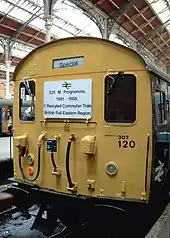 Refurbished British Railways Class 307 train showing the special headboard carried at the launch of the first refurbished train. |
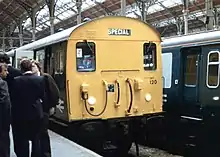 The front of a refurbished British Railways Class 307 train without the headboard. Part of a Class 315 train can be seen behind. |
 Side view of a refurbished British Railways Class 307 train, showing that it has also been repainted in blue/grey livery and that the first-class seating has been relocated and converted from compartment with side corridor to 'open' format |
 Interior of a refurbished British Railways Class 307 train showing the high capacity 2+3 standard/second class seating |
Operations
When new, these trains were used on the newly electrified Great Eastern Main Line, running between Liverpool Street and Southend Victoria on semi-fast services. In 1960 the electrification system on this route was converted from 1,500 V DC to 25 kV AC overhead, necessitating the rebuild of the fleet.
Following refurbishment in 1983, the fleet saw continued use; primarily on the Liverpool Street to Southend Victoria line, but also on the London, Tilbury and Southend line. From 1986, a few trains were repainted in Network SouthEast livery. By 1990, however, the class had been displaced from the LTS route by Class 310 trains, themselves cascaded from the West Coast Main Line following introduction of new Class 321/4 trains, supplemented temporarily by Class 317 trains. The Class 307 trains did not last much longer on the Great Eastern route, following the introduction of the new Class 321/3s.
By 1991, all Class 307 trains had been withdrawn from Network SouthEast services. However, five trains (307105/111/120/122/130) were overhauled at Doncaster Works for use on the newly electrified Wakefield Line service between Leeds and Doncaster. They received the West Yorkshire Metro maroon livery. The use of these units was intended as a stop-gap until three new Class 321/9 trains entered service. The final Class 307 trains were withdrawn in early 1993.
Following withdrawal, large-scale scrapping of the class was delayed as it was intended to rebuild the units as Class 300 parcels units. This plan was dropped in favour of building new Class 325 units. However, many of the driving trailer vehicles were eventually rebuilt as Propelling Control Vehicles (see below). The redundant intermediate trailers and motor vehicles were eventually scrapped.
Further use
Departmental use
Following withdrawal from service, several units were converted for further use as departmental vehicles. These are listed below.
Crash tests
Units 307101, 307106 and 307121 were used a crash-test units at Old Dalby, for use in simulated crashes for safety purposes.
Class 316 testbed unit
Unit 307118 was converted into a test unit for the 'Holec' three-phase AC traction motors and associated electrical gear used in the Class 323 EMUs. As 316998, the BDTBSO coach had its seating removed and the electrical equipment mounted in the passenger cabin and cooling provided via a large grill fitted in place of the guard's doors on the left hand side. The pantograph well was also revised, bringing it closer towards the cab.
Later, the unit was altered for 750 V DC third rail operation, the pickup shoes being mounted on the former MSO and renumbered 316997. After testing, the unit was stored at the back of Eastleigh T&RSMD. Scrapping took place at Caerwent in July 2006.
Postal conversions
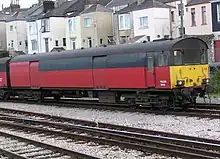
Proposed Class 300
Class 300 was allocated to a proposed fleet of parcels-carrying electric multiple units, which were to be converted from former Class 307 units.
In the early 1990s, the Class 307 passenger units were being withdrawn from service. At the same time, the Parcels sector of British Rail, later known as Rail Express Systems, were looking for a fleet of parcels multiple units, which would be more cost effective to run than locomotive-hauled stock used at the time. One suggestion was to convert a number of Class 307 units to meet the need, as had been done with four of the similar Class 302 units, and several Class 307 units were set aside and stored with this possibility in mind.
However, the age and design of the units counted against them, and the decision was taken instead to build new units, which became the Class 325.
Propelling Control Vehicles
After the decision not to proceed with the Class 300, Rail Express Systems instead sought driving trailers to operate in push-pull mode with a locomotive. This would remove the time-consuming process of changing the locomotive to other end of the train to allow it to leave a terminus. These newly refurbished vehicles were called Propelling Control Vehicles (PCVs), since it was envisaged that they would only be used to propel a train into or out of a terminus, and not used at high speed or over long distances.
It was decided to convert the vehicles from the many redundant Class 307 vehicles that were stored at various locations around the country. In 1994, two vehicles were rebuilt as prototype PCV vehicles, and underwent an extensive testing procedure. In the period 1994–1996, a further 40 redundant driving trailer vehicles were rebuilt by Hunslet-Barclay in Kilmarnock.
The rebuilding work included removal of the windows and slam-doors, the fitting of roller-shutter doors, and modernisation of the cab. The vehicles were given the TOPS code NAA and were numbered in the range 94300-327 (for former DTCOL vehicles) and 94331-345 (for former DTBSO vehicles).
Vehicle nos. 94300/301 were the prototype Propelling Control Vehicles. Due to their non-standard nature, they have since had their push-pull equipment isolated and are used as standard parcels vans. To reflect this change, the two vehicles have been renumbered to 95300/301.
Details of the vehicles converted to PCVs are shown below.
| Original no. | Former vehicle type | New PCV no. | Comments |
|---|---|---|---|
| 75004 | DTBSO | 94345 | - |
| 75005 | DTBSO | 94342 | - |
| 75007 | DTBSO | 94341 | - |
| 75008 | DTBSO | 94338 | - |
| 75011 | DTBSO | 94332 | - |
| 75012 | DTBSO | 94340 | - |
| 75014 | DTBSO | 94344 | - |
| 75016 | DTBSO | 94333 | - |
| 75017 | DTBSO | 94334 | - |
| 75022 | DTBSO | 94331 | - |
| 75024 | DTBSO | 94339 | - |
| 75027 | DTBSO | 94343 | - |
| 75029 | DTBSO | 94337 | - |
| 75031 | DTBSO | 94336 | - |
| 75032 | DTBSO | 94335 | - |
| 75102 | DTCOL | 94301 | Since renumbered to 95301 |
| 75103 | DTCOL | 94324 | - |
| 75104 | DTCOL | 94305 | - |
| 75105 | DTCOL | 94311 | - |
| 75107 | DTCOL | 94304 | - |
| 75108 | DTCOL | 94316 | - |
| 75109 | DTCOL | 94314 | - |
| 75110 | DTCOL | 94323 | - |
| 75111 | DTCOL | 94322 | - |
| 75112 | DTCOL | 94306 | - |
| 75113 | DTCOL | 94325 | - |
| 75114 | DTCOL | 94300 | Since renumbered to 95300 |
| 75115 | DTCOL | 94318 | - |
| 75116 | DTCOL | 94327 | - |
| 75117 | DTCOL | 94317 | - |
| 75119 | DTCOL | 94310 | - |
| 75120 | DTCOL | 94320 | Preserved, Mid-Norfolk Railway |
| 75122 | DTCOL | 94321 | - |
| 75123 | DTCOL | 94326 | - |
| 75124 | DTCOL | 94302 | - |
| 75125 | DTCOL | 94308 | - |
| 75126 | DTCOL | 94312 | - |
| 75127 | DTCOL | 94307 | - |
| 75128 | DTCOL | 94319 | - |
| 75129 | DTCOL | 94313 | - |
| 75130 | DTCOL | 94309 | - |
| 75131 | DTCOL | 94303 | - |
| 75132 | DTCOL | 94315 | - |
Carriage nos. 94303/07/10/11/15/16/17/20/22/31/34/36/37/38/39/40/ have been sold for scrap to CF Booths, and carriage nos. 94305/09/19/21/25/41/42/45 to TJ Thompson.
A rake of derelict PCV's are at Hellifield (N Yorks) (in Feb 2019) owned by West Coast Railways. The following units are stored at Hellifield 94303 94333 94326 94323 94504 94302 94527 94306 94546 94495 17/04/19
Preservation
One driving Brake trailer from unit 307123 has been saved for preservation.
- 75023 – Colne Valley Railway. Restoration ongoing.
Two PCV conversion has also been saved for preservation.
- 94320 – Mid-Norfolk Railway. Under restoration as stores vehicle.
- 95301 - Prototype PCV, preserved, Andrew Briddon Locomotives, Darley Dale.
One vehicle, DTBSO no. 75018 (ex-977708) was bought by the AC Loco Group at Barrow Hill Engine Shed for spares recovery. It was scrapped at Caerwent MOD in 2006.
References
- 1 2 3 4 Longworth 2015, pp. 22–23, 124, 152, 172–175
- 1 2 3 4 5 Fox 1994, p. 11
- 1 2 3 4 5 6 7 8 9 10 11 12 13 14 "Class 307". The Railway Centre. Archived from the original on 24 July 2008. Retrieved 22 February 2016.
{{cite web}}: CS1 maint: unfit URL (link) - 1 2 3 4 5 6 7 8 9 "Vehicle Diagram Book No.210 for Electrical Multiple Units (including A.P.T.)" (PDF). Barrowmore MRG. BRB Residuary Ltd. EC204, EE307, EH222, EO202. Archived from the original (PDF) on 3 March 2016. Retrieved 22 February 2016.
- 1 2 3 Fox 1987, p. 52
Sources
- Fox, Peter (1987). Multiple Unit Pocket Book. British Railways Pocket Book No.2 (Summer/Autumn 1987 ed.). Platform 5 Publishing Ltd. ISBN 0906579740. OCLC 613347580.
- Fox, Peter (1994). Electric Multiple Units. British Railways Pocket Book No.4 (7th ed.). Platform 5. ISBN 9781872524603.
- Longworth, Hugh (2015). British Railways Electric Multiple Units to 1975. Oxford Publishing Co. ISBN 9780860936688. OCLC 923205678.